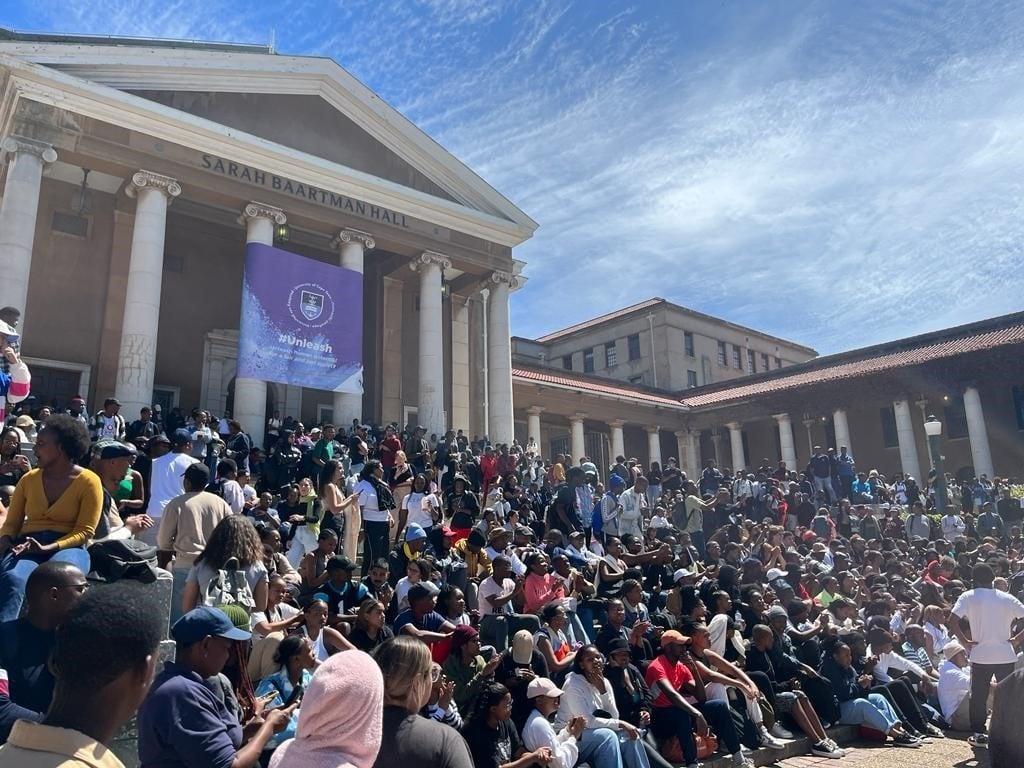Africa-Press – South-Africa. As student protests at the University of Cape Town (UCT) reached boiling point on Friday, the acting vice-chancellor, Professor Sue Harrison, said South African universities struggled with fee blocks and financial exclusions every year.
Harrison wrote to UCT staff and students after protests escalated throughout the day and resulted in the arrests of two people.
Students demanded that Harrison leave and shouted, “Sue must fall” and “Sue must go” at a mass meeting on Friday after a dramatic morning involving stun grenades and heavy police presence.
“It is important for all registered students to be able to start the academic year on time and to continue their studies without interruption or the trauma of unlawful protest. Many UCT students and their families have made substantial sacrifices to attain and have access to this education,” the acting VC said.
Harrison added that the UCT council had approved a policy that guides the university in dealing with financial exclusions.
“Every year, we review and improve the measures we have in place to balance two necessary objectives: to assist academically eligible students in registering and continuing with their studies and to ensure the financial sustainability of our university so that the academic project can continue,” she said.
Students unable to register
However, Harrison said the sad reality was that some students were still unable to register because of the size of their debt and their inability to contribute any amount to reduce it.
She said:
The university’s cumulative historic student debt stands at more than R385 million.
“UCT cannot maintain a financially sustainable university under such conditions of financial insecurity. So, we have to implement UCT’s council-approved ‘fee block’ policy to deliver the quality education that you, as students, expect and deserve. But at the same time, we have increased the level of fee debt at which students can still register from R1 000 to R10 000, allowing an extra 3 400 students to register this year,” she stressed.
Harrison said about 4 100 students who started this year with fee blocks have been able to register for the 2023 academic year.
“UCT has budgeted R355 million for student financial aid in 2023 – more than doubling the allocation over 2022, even though the university is operating on a significant deficit budget for 2023. We remain grateful to UCT fee payers, who are paying tuition fees for students. Tuition fees are the biggest source of income for UCT, especially as government subsidies have declined in recent years,” she stressed.
‘Lifting’ fee blocks
The university’s executive and the representative student council (SRC) have been at odds over a proposal tabled during a council meeting on Monday night for the university to “lift” fee blocks as a blanket concession.
Harrison explained the UCT executive was exploring different measures, along with the SRC, to assist students with fee blocks.
“For instance, we have made a further R5 million available for this purpose on condition that the SRC matches this amount through fundraising efforts supported by the executive. In this way, we can further respond as a community to assist those who are financially challenged. We have also established a new partnership with a private entity and, as a result, R5 million has been made available to clear 2022 debt,” she said.
For More News And Analysis About South-Africa Follow Africa-Press






